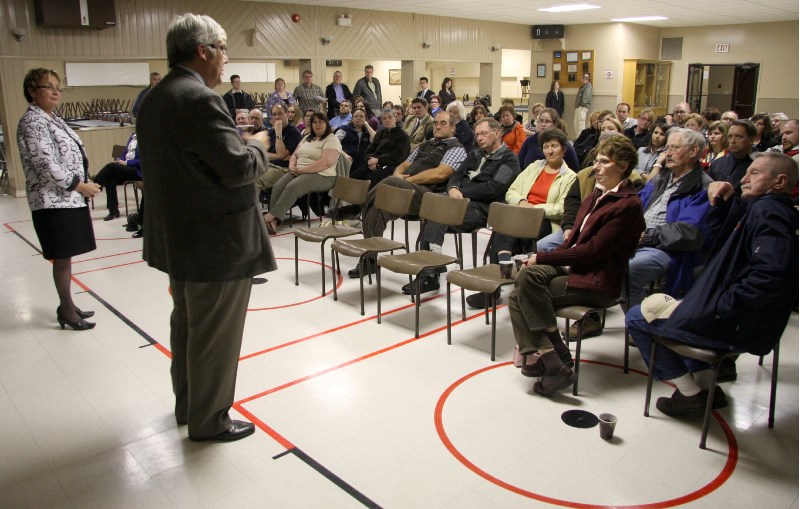Area teachers used a few hours with Education Minister Dave Hancock last week to voice their views and concerns about the future of the system they teach in.
Speaking to a friendly crowd at Ardmore Community Hall, Hancock addressed everything from testing and special needs education to university debt that hangs over young teachers. The supper-first gathering, set up during Education Week by MLA Genia Leskiw, was a polite one, but Hancock still heard several concerns.
Kenneth Pshyk, an administrator from Glendon School, said he thought changes to special education shouldn't result in fewer educational assistants in the classroom.
“When you're talking about special needs, really keep that in mind that it's the people that are helping these kids,” he said.
“I really don't want to lose anymore teacher assistants because they are so valuable,” Pshyk said, earning applause from the crowd of current teachers and retirees.
At a press conference earlier in the day Dave Hancock said many school boards in Alberta arranged the same percentage pay raise for support staff as for teachers. He said while the government has not funded the thee per cent AAWEI increase, it is “working over the long term with school boards to manage that increase.”
Ron Young, a teacher from R.A. Reynolds School, said at the teachers meeting that he hoped the next rewrite of the School Act would correct a “glaring loophole” and become more consistent.
“I would ask that all school boards that wish to close a school either have to do all of the ugly things, or none of the ugly things.” He said the loophole allows school boards that transfer a program to not have to go through the four steps otherwise required to close a school.
Hancock said he hoped the next rewrite of the School Act would be less prescriptive and more permissive toward communities deciding how to configure schools.
David Ripkens told the minister that as a recent graduate and new teacher in Iron River, he is saddled with a large debtload. He added there needs to be more efforts made to keep young teachers in rural areas.
Ripkens got a sympathetic ear on the issue of preparing teachers to work in rural communities, but considerably less on the debtload faced by graduates. Hancock called low-interest student debt a great investment.
Kindergarten teacher Lisa DeAbreau, who is also a parent of a Grade 3 student, told the minister strictly administered mandatory testing in Grade 3 adds unnecessary stress for young students.
“I understand the standard of assessment, that you need to have that. I just find the way the test is being done is unrealistic. They're just little kids,” she told Hancock.
She also said she felt French immersion students were being penalized by the system because they write more tests. She asked that the English and French tests be combined or altered so French immersion students don't have to write more tests.
“The bottom line is there's real questions around the most appropriate form of assessment and what it is we need to assess,” Hancock responded. “I've been tempted to wave my magic wand such as it is and say it should go away.”
Hancock said tests have proved to be a reliable indicator of how students will achieve later on in life, but haven't necessarily helped to improve how students are taught.
Leo Himmelsbach, a retired teacher who taught at Grand Centre High School, said he wants to see the 30 per cent written response on math and science diploma exams brought back. He doesn't believe all multiple-choice questions improve the way students communicate.
“It changes the way teachers evaluate their kids,” he said after the meeting.
After the meeting Hancock addressed the issue of school board deficits.
“This is going to be a tough fiscal year. We're going to have to learn to do things better and how to deploy our resources better,” he said.
He said school boards would have to deal with deficit budgets until a solution can be found in the long term. He encouraged school boards to look at long-term planning.
“There's a shortage of funds this year. We've got a commitment to balance the budget in three years and we're going to do it, and that's going to be difficult,” he said.



